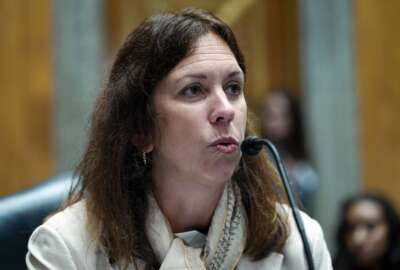
VA ‘not confident’ EHR issues preventing future rollouts are resolved following Oracle fix
The Department of Veterans Affairs is saying it's too soon to know if a vendor update has resolved patient safety issues holding up future rollouts of its new...
The Department of Veterans Affairs is saying it’s too soon to know if a vendor update has resolved patient safety issues holding up future rollouts of its new Electronic Health Record (EHR).
Oracle, the parent company of the VA EHR contractor Cerner, notified the Senate VA Committee earlier this month that it provided a fix to an “unknown queue” problem with the VA system.
The problem, as documented by the VA inspector general’s office, has led to thousands of clinical orders disappearing in an unmonitored inbox, causing patients to miss follow-up care.
VA Secretary Denis McDonough told reporters on Wednesday it remains unclear whether a single fix to the unknown queue is enough to fully address the concerns of VA employees and patients, adding that the VA is still looking to determine the scope of its EHR challenges.
“We continue to have concerns about queues, unknown queues, unknown kind of areas where people, where veterans may end up,” McDonough said. “I think that concern is significant enough that we’re not talking about a single, discrete issue that would suggest … a single discrete fix. But rather, they’re a pretty fundamental set of improvements. We’re continuing to make assessments about how big the challenge is.”
The VA recently postponed EHR launches planned for this summer, and has scheduled the EHR to go live at 25 VA medical centers in fiscal 2023.
However, Deputy VA Secretary Donald Remy told the Senate VA Committee on Sept. 21 that the EHR go-live schedule is still subject to changes, if the system doesn’t pass a checklist that includes training for VA employees and patient safety criteria.
Mike Sicilia, the executive vice president for industries at Oracle, told the committee that Oracle delivered a fix to the unknown queue problem on Aug. 1.
However, VA Undersecretary for Health Shereef Elnahal on Wednesday stopped short of saying the issue has been completely resolved.
“I am not confident that we’ve completely solved that set of issues,” Elnahal said.
Elnahal said the agency is continuing to work with Oracle-Cerner to definitively understand the basis of its EHR challenges, and troubleshooting the EHR rollout “rises to the top, in my mind, for patient safety risks.”
“A big part, at least of my definition of success in this initiative, is going to be configuring the system better and better over time, to make the workflows easier for the front-line clinician,” he said. “The system should ultimately be something that enables better care and is intuitive. And we’re not there yet with this system. It has to improve.”
Elnahal recently told the Senate committee, following a site visit in Columbus, Ohio, that the EHR contributed to VA employee burnout, and in some cases, led to employees quitting their jobs.
“There’s literally a systemwide focus now on clinician burnout, employee burnout, leading by example, and respecting what makes our employees whole and supporting our employees as much as we can. And so that’s going to be a huge priority for me to further those efforts, and get them to even more employees,” Elnahal said.
McDonough added that the VHA, through its REBOOT task force, is also taking steps to address burnout and working conditions among its health care workforce.
“This issue of burnout is front and center for us. And it’s an issue in the workforce generally at VA and the labor force generally in the United States. I’m really proud of the work we’re doing to get ahead of it,” McDonough said.
The VA, meanwhile, is preparing its health care workforce and benefit claims processors to take on an added workload.
Acting Undersecretary for Benefits Joshua Jacobs, said Veterans Benefits Administration employees are stepping up to prepare for more veterans applying for benefits through the recently passed PACT Act. VBA, he added, hired 1,700 additional claims processors over the past year.
“There is a tremendous amount of behind-the-scenes work that’s been happening since the day the bill was signed, and even before that’s going to pay dividends for years to come,” Jacobs said.
The PACT Act makes 20 conditions as presumptive as being connected to a veteran’s military service, making them eligible for VA treatment and benefits. Veterans with any of these 20 conditions have been able to file VA claims since Aug. 10, the day the PACT Act was signed into law.
The VA will immediately start accepting claims under the PACT Act for these 20 presumptive conditions, rather than phase them in piecemeal over the next few years.
“If we had adopted the phased approach, a great many veterans and beneficiaries would have had to wait years for claims decisions and the benefits that they’ve earned. And that’s not something we were willing to accept,” Jacobs said.
Jacobs said the VA is hiring and training new employees and upgrading systems in order to start processing the PACT Act claims received on Jan. 1.
“We’re going to be ready when that day comes. Right now, VA is delivering more benefits more quickly to more veterans than ever before, and we’re processing claims at the fastest rate in VA history,” he said.
VBA, as of Sept. 12, completed 1.6 million claims for the fiscal year, a 5% increase from the prior fiscal year, which was previously its most productive year for processing claims.
On Aug. 11, the day after the PACT Act was signed into law, was the VA’s all-time high for online filing of disability claims.
Veterans filed more than 200,000 total claims ratings since Aug. 10, a 21% increase compared to the same period last year. About 70,000 of those claims are PACT Act-related claims.
“This tremendous increase in claims is going to increase the number of claims awaiting action in the short term. But the sooner veterans apply, the sooner we can begin delivering the benefits and the services that they’ve earned,” Jacobs said.
Elnahal said the PACT Act, effective Oct. 1, extends the window for certain combat veterans to sign up for VA care from five years to 10 years. He said the VA expects at least 300,000 veterans will have a new opportunity to enroll in VA care under this PACT Act provision.
“We are really encouraging veterans to apply for enrollment. And we look forward to welcoming them into VA health care,” Elnahal said.
Elnahal said the VHA expects its health care workforce will be able to take on this additional workload
“We’re doing everything we can to prepare our health care system as close to the veterans as possible by beginning to provide data to our health care center leadership across the country on what to expect in terms of preparing their operation to receive no only new veterans who newly qualify, but veterans who will have increased reliance on our health care system, because of this historic legislation,” Elnahal said.
McDonough said hiring at VA remains its “number-one strategic challenge,” and said the VHA in particular is working to “meet very aggressive hiring rules in a very tough labor market.”
Starting in November, all veterans enrolled in VA health care will receive go through a toxic exposure screening at least once every five years to ensure they are taking full advance of the benefits they qualify for.
The VA developed this capability through a pilot at seven VA medical centers earlier this month.
As of Sept. 16, more than 37% of the 13,380 veterans screened identified some level of concern about toxic exposure.
“That represents a substantial percentage of veterans in our care who communicated that they may have been exposed to a toxin that we were not aware of, which can mean more benefits and potentially a higher priority categorization for so many veterans,” Elnahal said.
Copyright © 2025 Federal News Network. All rights reserved. This website is not intended for users located within the European Economic Area.
Jory Heckman is a reporter at Federal News Network covering U.S. Postal Service, IRS, big data and technology issues.
Follow @jheckmanWFED
Related Stories
Veterans Health Administration takes on one of the pandemic’s most vexing challenges




